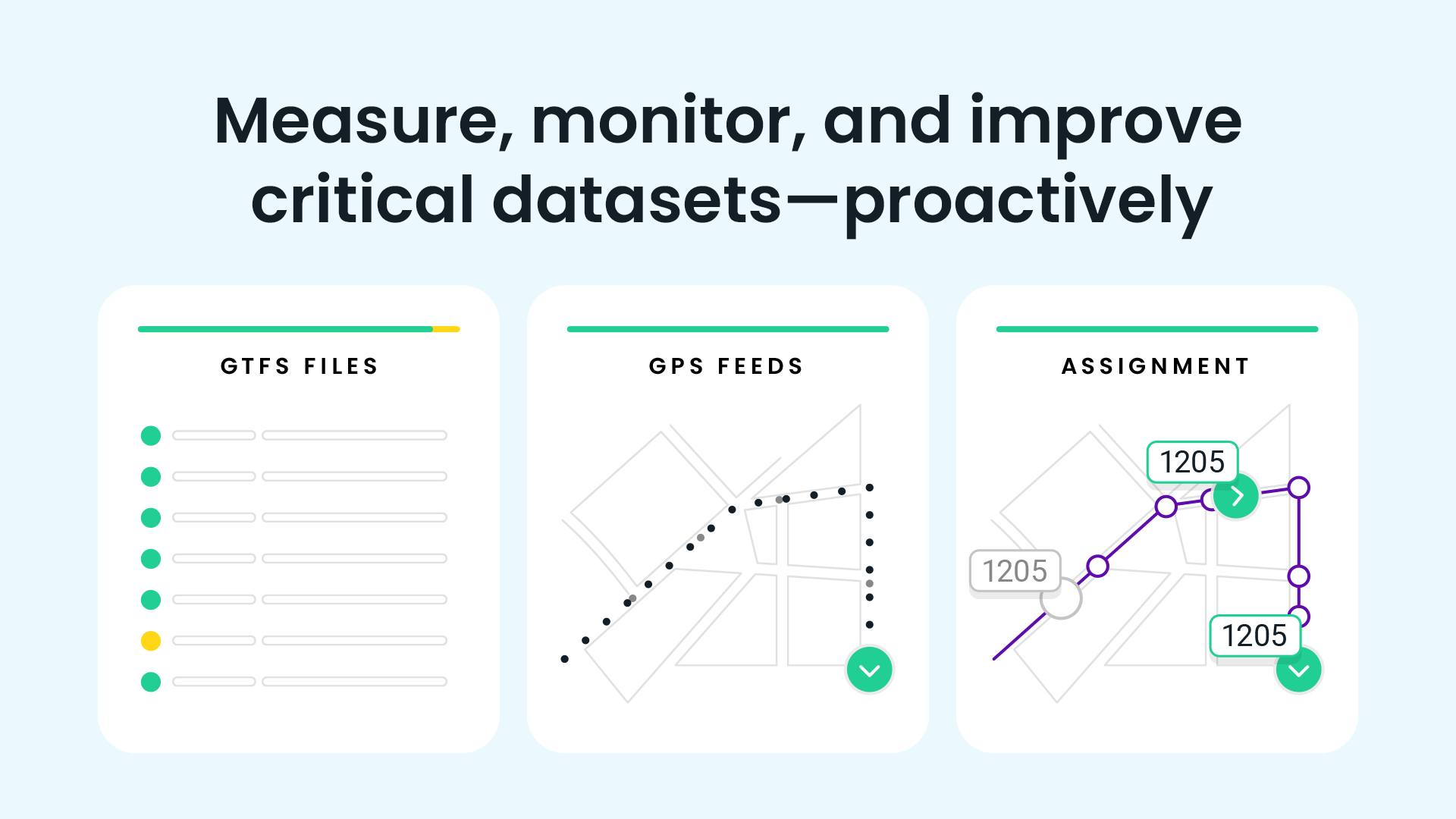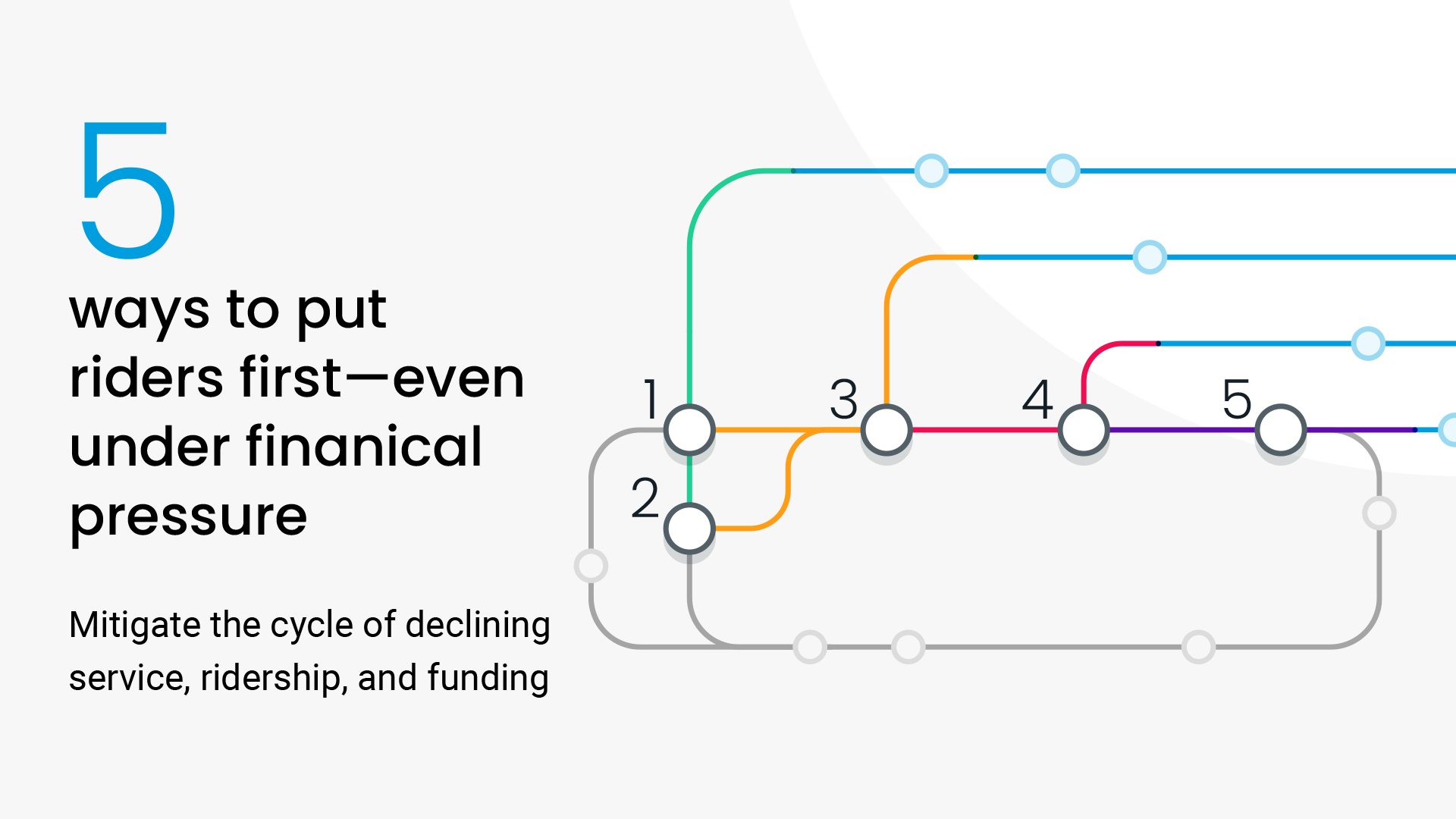
April 2, 2020
How Are Public Transit Agencies Responding to COVID-19? Transit Agency Response and Official Recommendations

April 2, 2020
How Are Public Transit Agencies Responding to COVID-19? Transit Agency Response and Official Recommendations
April 2, 2020
How Are Public Transit Agencies Responding to COVID-19? Transit Agency Response and Official Recommendations
The American Public Transportation Association (APTA), the Canadian Urban Transit Association (CUTA), and the International Association of Public Transport (UITP) have all released recommendations to help agencies during the COVID-19 outbreak. Agencies have had to act fast to protect riders and staff, and make difficult decisions to adapt to evolving conditions.
So what do these recommendations call for, and how are agencies using them? Much of the advice is centered around keeping staff and riders distanced from each other and protected from contact with the virus. Here, we present APTA, CUTA, and UITP’s recommendations and a window into what they look like in practice, by looking at survey results from Transit, which received information from more than 60 transit agencies on what policies they are putting in place to safely ride out the pandemic
Got questions about how transit agencies are responding to COVID-19? Register for our interactive webinar discussion happening on April 8.
Communication
One of the most important actions agencies can take to protect their riders and their employees is to communicate their plans and keep everyone informed. It’s why APTA, CUTA, and UITP issued multiple recommendations around communication:
Official recommendations (and who recommends them):
- Simple/straightforward communication (APTA)
- Provide internal communication to operators and staff on proper hygiene and COVID-19 status (CUTA/UITP)
- Use media to inform passengers (APTA/CUTA/UITP)
- Review transit agency/municipal pandemic management plans and increase communication with local health authorities (APTA/CUTA/UITP)
What agencies are doing:

Every transit agency surveyed had extended at least one communication regarding the pandemic, and many had implemented service alerts and updated their GTFS information.
Employee procedures
Transit professionals working on the front lines are getting daily exposure to COVID-19, and agencies need to do everything they can to protect them. Transit agencies might institute protocols for those essential employees, and limit exposure for the rest of their staff.
Official recommendations (and who recommends them):
- Develop protocols for frontline staff (CUTA/UITP)
- Work from home for activities that do not require physical presence (UITP)
What agencies are doing:

On-board changes
There are a lot of practical recommendations for agencies on how to enhance cleaning and enact social distancing measures to maintain safety and keep transmission low. This is where agencies can get into the nuts and bolts of what to do on board vehicles.
Official recommendations (and who recommends them):
- Separate operators and customer service staff from passengers (like with an operator shield) (APTA/CUTA/UITP)
- Personal protection equipment (APTA)
- Sanitation for system and provide operators with sanitizer(APTA/CUTA/UITP)
- Ventilation (APTA)
- Rear-door boarding (CUTA/UITP)
- Screen paratransit and specialized transit passengers for COVID-19 during the booking process (CUTA/UITP)
What agencies are doing:

Service changes
Official guidelines state across the board that service should be modified. Staff is reduced and people are using transit less often due to the closing of schools, offices, and non-essential businesses. Many public transit agencies have found success by offering a weekend/holiday schedule and adjusting service for their area’s needs.
Official recommendations (and who recommends them):
- Change service patterns based on local considerations/social distancing (APTA/CUTA/UITP)
What agencies are doing:

Fare policy
Eliminating or reducing fare collection and enforcement achieves several important goals at once: It eliminates the need for interactions between the bus driver and passengers and it prevents people from clustering around ticket-taking stations. It also eliminates any risks from collecting currency itself, as the virus has been shown to live on paper and metal.
Official recommendations (and who recommends them):
- Eliminate/reduce fares Eliminate ticket inspection (UITP)

High-level action
Public transit needs legislative support now more than ever. Public transit is an essential service and the lifeblood of our cities. With ridership taking a nosedive, transit agencies aren’t getting the funds that are critical to maintaining operations. And transit workers are interacting with the public more than most, making them one of our more vulnerable populations. Public transit needs protective legislation and critical funding.
Official recommendations (and who recommends them):
- Legislative action (APTA)
- Legislative request (CUTA)
Ask other transit professionals to learn more
Want to learn more about how transit agencies are responding to COVID-19? Join other transit professionals in our “ask me anything” webinar, you can use our interactive format to pose questions, start discussions, and share best practices on the important topics for you and your agency. Please note: this is a purely a community-building webinar to share best practices. There will NOT be any commercial or product references in the webinar.
Register today for Public Transit in the Time of COVID-19, presented by Swiftly and Transit. Wednesday April 8 at 10am PT / 1pm ET. Can’t make the live session? All registrants will receive a recording of the webinar to watch at their leisure, so RSVP today.
Data was last updated on March 21, 2020
Request a demo
The rich text element allows you to create and format headings, paragraphs, blockquotes, images, and video all in one place instead of having to add and format them individually. Just double-click and easily create content.
Last Name, Agency

What’s a Rich Text element?
What’s a Rich Text element?
What’s a Rich Text element?
What’s a Rich Text element?
What’s a Rich Text element?
The rich text element allows you to create and format headings, paragraphs, blockquotes, images, and video all in one place instead of having to add and format them individually. Just double-click and easily create content.
Last Name, Agency
Static and dynamic content editing
A rich text element can be used with static or dynamic content. For static content, just drop it into any page and begin editing. For dynamic content, add a rich text field to any collection and then connect a rich text element to that field in the settings panel. Voila!
How to customize formatting for each rich text
Headings, paragraphs, blockquotes, figures, images, and figure captions can all be styled after a class is added to the rich text element using the "When inside of" nested selector system.
- text goes here
- text goes here
- text goes here
- text goes here
- text goes here
- text goes here










